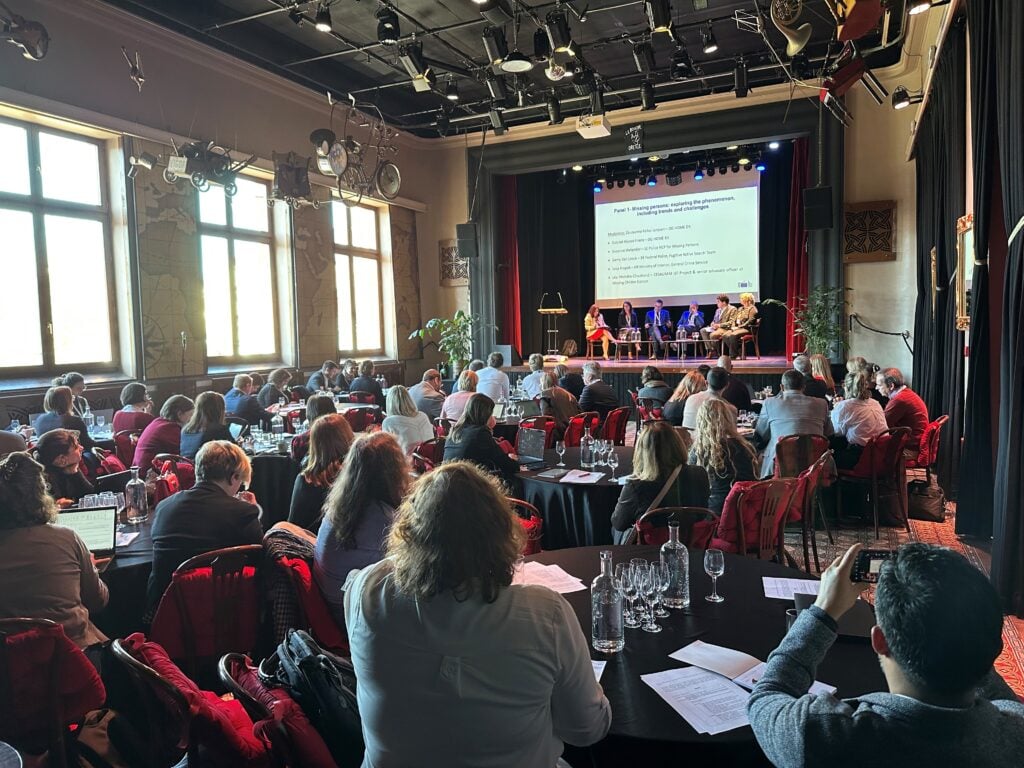Brussels, March 2025 – Frank Hoen, Chairman of AMBER Alert Europe, delivered a compelling message at an event hosted by the European Commission’s Directorate-General for Home Affairs (DG HOME), urging collective, EU-wide action to address the pressing issue of missing children and missing persons. The event, held in collaboration with the Community for European Security Research and Innovation (CERIS), brought together key stakeholders from across Europe to explore the urgent need for innovation, collaboration, and shared solutions in tackling disappearances across Europe. The event served as a valuable forum for AMBER Alert Europe to share insights gained from 12 years of dedicated work in the field of missing children and missing persons. Leveraging its extensive expertise, the organisation actively participated in discussions, offering insights and recommendations on potential future actions.
A Unified Response to a Cross-Border Challenge
AMBER Alert Europe Chairman emphasised the urgent need for unified efforts from law enforcement agencies, civil society organisations, and EU institutions. In his address, Hoen stressed that Europe can no longer afford fragmented approaches to the cases of missing, children, missing persons. Instead, a coordinated and large-scale research initiative is essential to meet the needs of today’s increasingly complex and cross-border realities. “Individual efforts are important, but they are not enough,” said Hoen. “Only by uniting law enforcement, civil society, and EU institutions under a single, ambitious research effort can we build the frameworks needed to prevent people from going missing and to recover the missing swiftly and safely.”
Highlighting the limitations of fragmented responses, he advocated for an unprecedented, large-scale research initiative aimed at preventing and resolving cases of missing persons. “Now is the time for coordinated action,” said Hoen. “We must go beyond isolated efforts and come together to build a comprehensive, collaborative response to the challenges we face. Only through unity can we bring about the meaningful change that missing persons and their families so desperately need.”
To support this vision, AMBER Alert Europe highlighted that the Foundation has brought forward an unprecedented initiative for a regional pilot project in cooperation with multiple partners. This effort aims to serve as a critical first milestone in the organisation’s broader goal of launching a pan-European large-scale evidence-based research programme focused on missing children, missing persons.
Paving the Way for a European Act on Missing Children
A core ambition shared by AMBER Alert Europe is to build the much-needed foundation and to strive towards a European Act on Missing Children and Missing Persons. Hoen outlined the vision for such an act as a cornerstone in addressing the complex challenges of child disappearances, ranging from prevention and early intervention to cross-border cooperation and technological innovation. “There is a real and urgent need for a harmonised legislative framework,” Hoen emphasized. “Such an act would enable EU Member States to respond cohesively to cross-border missing cases, ensuring that borders do not become barriers in the search for missing children.” The rationale for an EU Act rests on two key pillars:
- The Cross-Border Nature of the Issue: With open borders and freedom of movement in the European Union, missing children, missing person cases often span multiple countries. A national approach cannot meet the scale of this challenge;
- The Complexity and Scope of the Problem: From online grooming and trafficking to mental health and domestic abuse, disappearances are driven by diverse and evolving causes. Only a comprehensive and EU-level response can address these issues holistically. The Victims’ Rights Directive demonstrated the EU’s ability to provide comprehensive multifaceted protection for vulnerable individuals. A similarly unified and coordinated approach is now needed to address the issue of missing children, missing persons.
Evidence-Based Solutions to Critical Questions
To support policymaking on missing children, missing persons, AMBER Alert Europe is therefore calling for a large-scale, evidence-based research initiative aimed at addressing key questions, including: 1. How can the EU prevent the disappearance of more than 100,000 children reported missing each year? 2. What are the most effective strategies to protect children in an increasingly digital and interconnected world? 3. How can innovation accelerate cross-border cooperation and enhance the recovery of missing persons? 4. Which root causes of disappearances require the most urgent intervention? 5. What emerging threats and trends must be addressed proactively?

Collaborative Momentum Across Europe
The DG HOME event also showcased the remarkable work of the Police Expert Network on Missing Persons (PEN-MP), which continues to make strides under its current Dutch Presidency. PEN-MP plays a critical role in enhancing cross-border cooperation in cases of missing persons across Europe. The event further featured contributions from AMBER Alert Europe’s long-standing partners, including Österreich Findet Euch (represented by Chairman Christian Mader), and the ITAKA Foundation (represented by Vice-President Izabela Jezierska-Świergiel). Their contribution underscored the collective responsibility and diversity of expertise within the European Missing Persons Community.
A Call to European Action
AMBER Alert Europe expresses its sincere gratitude to DG HOME for spotlighting the issue of missing children and for highlighting the unique role of AMBER Alert Europe in advocating for increased focus on missing children and missing persons within the EU’s Community for European Security Research and Innovation. The event served as a vital reminder of the need for deeper, sustained engagement of all stakeholders on the European level.
As Europe looks ahead, AMBER Alert Europe remains steadfast in its mission to prevent children from going missing and to bring missing children home. Through innovation, collaboration, and a bold vision for policy change, the organisation continues its commitment to a safer Europe for children.
